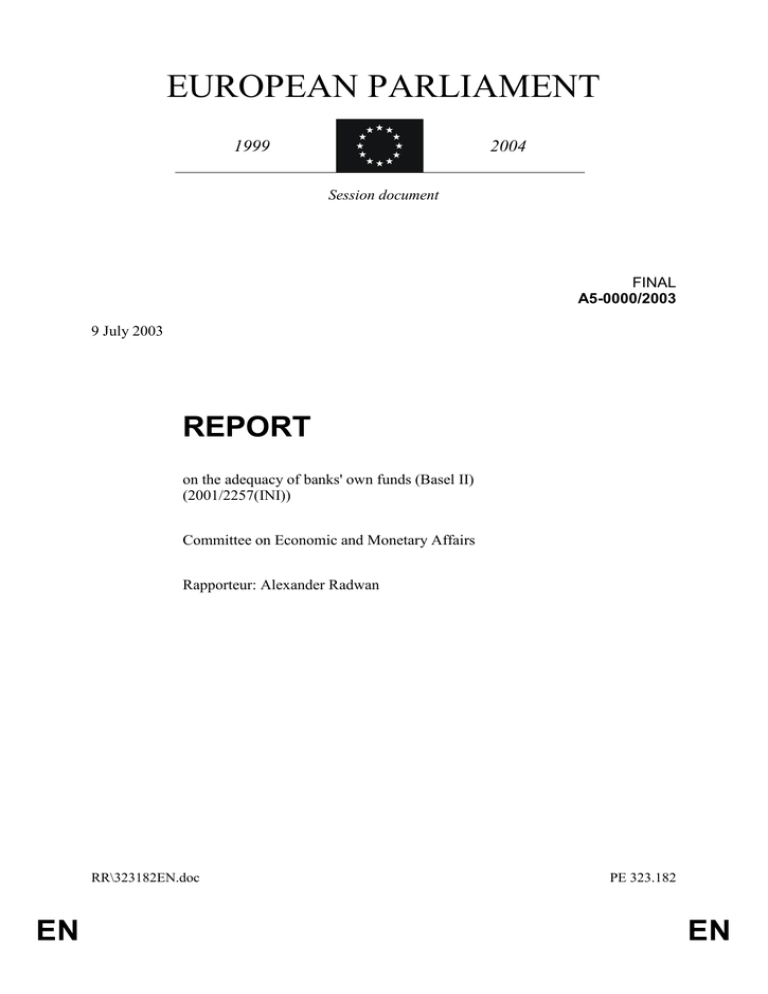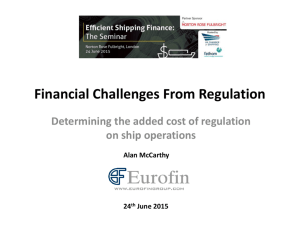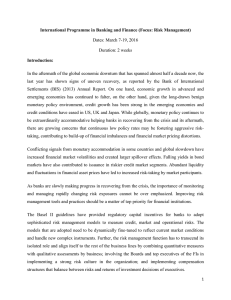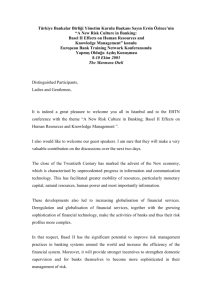EUROPEAN PARLIAMENT REPORT 1999 2004
advertisement

EUROPEAN PARLIAMENT 1999 2004 Session document FINAL A5-0000/2003 9 July 2003 REPORT on the adequacy of banks' own funds (Basel II) (2001/2257(INI)) Committee on Economic and Monetary Affairs Rapporteur: Alexander Radwan RR\323182EN.doc EN PE 323.182 EN PE 323.182 EN 2/14 RR\323182EN.doc CONTENTS Page PROCEDURAL PAGE .............................................................................................................. 4 MOTION FOR A EUROPEAN PARLIAMENT RESOLUTION ............................................ 5 EXPLANATORY STATEMENT............................................................................................ 11 RR\323182EN.doc 3/14 PE 323.182 EN PROCEDURAL PAGE At the sitting of 4 July 2002 the President of Parliament announced that the Committee on Economic and Monetary Affairs had been authorised to draw up an own-initiative report, pursuant to Rules 47(2) and 163 of the Rules of Procedure, on the adequacy of banks' own funds (Basel II) . The Committee on Economic and Monetary Affairs had appointed Alexander Radwan rapporteur at its meeting of 15 April 2002. The committee considered the draft report at its meeting of 2 October, 8 October, 3 December 2002, 19 February, 20 May, 17 June, 7 July and 8 July 2003. At the last meeting it adopted the motion for a resolution by 38 votes to 0, with 1 abstention. The following were present for the vote: Christa Randzio-Plath chairwoman; José Manuel García-Margallo y Marfil, Philippe A.R. Herzog, John Purvis, vice-chairmen; .Alexander Radwan, rapporteur; Generoso Andria, Roberto Felice Bigliardo, Hans Blokland, Jean-Louis Bourlanges (for Brice Hortefeux), Hans Udo Bullmann, Benedetto Della Vedova, Bert Doorn (for Ingo Friedrich), Harald Ettl (for Helena Torres Marques), Jonathan Evans, Carles-Alfred Gasòliba i Böhm, Robert Goebbels, Lisbeth Grönfeldt Bergman, Mary Honeyball, Christopher Huhne, Pierre Jonckheer (for Alain Lipietz), Othmar Karas, Giorgos Katiforis, Piia-Noora Kauppi, Christoph Werner Konrad, Wilfried Kuckelkorn (for a Member to be nominated), Werner Langen (for Astrid Lulling), Thomas Mann (for Mónica Ridruejo), Ioannis Marinos, David W. Martin, Hans-Peter Mayer, Miquel Mayol i Raynal, Fernando Pérez Royo, Bernhard Rapkay, Olle Schmidt, Peter William Skinner, Bruno Trentin, Ieke van den Burg (for Pervenche Berès), Theresa Villiers, Amalia Sartori (for Renato Brunetta pursuant to Rule 153(2)). The report was tabled on 9 July 2003. PE 323.182 EN 4/14 RR\323182EN.doc MOTION FOR A EUROPEAN PARLIAMENT RESOLUTION on the adequacy of banks' own funds (Basel II) (2001/2257(INI)) The European Parliament, – having regard to the third consultative paper of the Basel Committee on Banking Supervision on a new Basel capital accord1, – having regard to the Basel committee's Third Quantitative Impact Study (QIS 3)2 , – having regard to the Commission services' third consultative paper on capital requirements for credit institutions and investment firms3, having regard to the hearing of experts from the Financial Services Panel by the Committee on Economic and Monetary Affairs of the European Parliament on 18 September 2002, – having regard to the hearing of representatives of the banking sector, associations of undertakings and the national regulatory authorities on 19 February 2003, – having regard to Rules 47(2) and 163 of its Rules of Procedure, – having regard to the report of the Committee on Economic and Monetary Affairs (A5-0000/2003), A. whereas the need to revise the current rules on capital adequacy is widely recognised and advocated, as they no longer adequately reflect the actual risk profile of numerous banks and so raise the prospect of distortions, inaccurate assessments and hidden risks induced by the regulatory framework itself, B. whereas the danger of procyclicality is inherent in the increased risk-sensitivity to which the new approach aspires, because credit risks typically increase at times of economic downturn and the new regime could result in banks further restricting their loan exposure in such situations, thus exacerbating the recession, C. whereas many improvements in relation to the financing of small and medium-sized enterprises (SMEs) were secured in the course of the negotiations, but the prospect of a deterioration in financing terms still cannot be ruled out, particularly as to date no adequate study of the potential impact of the new rules on the SME sector has been carried out, 1 http://www.bis.org http://www.bis.org/bcbs/qis/qis3results.pdf 3 http://europa.eu.int/comm/internal_market/regcapital/cp3/2003-consultpaper3_en.htm 2 RR\323182EN.doc 5/14 PE 323.182 EN D. whereas, because of the national tax legislation applicable to partnerships, many small and medium-sized enterprises often have only very modest own funds, E. whereas, because firms are switching to capital market financing, banks can reduce their risk exposure; whereas in most Member States traditional bank lending relationships enable borrowing firms to benefit from advice on their business and investment plans; whereas, however, credit institutions and investment firms should provide greater assistance than hitherto, especially to small and medium-sized enterprises, regarding the possibilities offered by securities issues, F. whereas the reform of the capital adequacy framework must take account of the European Union’s objective of becoming the most competitive economy and of protecting consumers’ and depositors’ rights, G. whereas it is important to strive for consistency between the new EU capital adequacy framework, that will be defined by the Capital Adequacy Directive 3, and the Basel II Accord in order to preserve the competitive position of EU credit institutions, H. whereas the European financial services industry wants to ensure that the EU implements the future Capital Adequacy Directive 3 on a timescale similar to the way in which Basel II is implemented in other non-EU countries in order to have consistent rules and avoid placing the EU at a competitive disadvantage, I. whereas cooperation among EU supervisors is necessary to rationalise national discretion in order to avoid double reporting and any supplementary costs, 1. Welcomes the basic principles of the new Basel Accord, as the stability of the international financial system and the protection of bank customers’ funds require the formulation of rules on banking supervision which adequately reflect the real risk profile of banks; 2. Emphasises, however, that the cost impact of the proposal on firms of all sizes and from all affected sectors must be properly assessed; supports a framework which seeks to build on, encourage and utilise industry best practice and prudent risk management rather than superimposing a wholly new regulatory framework over the top of existing practice; emphasises the need to take into account the particular characteristics and risk profiles of non-banks such as: (i) investment firms (both large and small), (ii) firms which carry out different types of financial activity within the same business and, (iii) (if they are included in the capital framework in the future) firms specialising in commodity derivatives; 3. Considers that the possibility that the new rules will generate procyclical effects has PE 323.182 EN 6/14 RR\323182EN.doc not been completely eliminated, despite the adjustment of risk weighting curves; stresses the need to examine the macro-economic consequences of the new accord before it enters into operation by carrying out a further impact study and to make any changes necessary; 4. Regrets that the Basel Accord and other international agreements laying down a framework for legislation at EU level came into existence without any form of democratic mandate or control by the European Parliament; expresses the view that, in future, questions with such far-reaching political implications should not be determined in advance by expert committees alone; 5. Emphasises the need to build mechanisms into the new directive to ensure that the technical measures can be amended quickly according to the comitology procedure, provided Article 202 of the EC Treaty is amended in such a way as to ensure that the European Parliament exercises substantial control over level 2 measures and also ensure the involvement of all market participants in an advisory committee, so as to get a flexible EU framework that reacts to market innovation or systemic needs; 6. Supports the view that the Basel rules carried into effect in the EU should apply to a broad range of banks and investment firms where this is appropriate in terms of the risk profile of the institution in order to ensure a uniform standard of supervision and fair competition; regrets that the US authorities’ plans to apply the most progressive aspects of the Basel agreements only to an extremely limited number of banks, and to exclude certain classes of investment firms altogether, make no contribution to achieving internationally comparable standards of supervision and unilaterally impose a cost burden on EU banks; calls, therefore, for an appropriate cost-benefit relationship to be taken into account when drawing up system requirements, so as to avoid any competitive disadvantages for the European economy; calls on the Commission to work closely with supervisory authorities of third countries, in particular with the US Federal Reserve Board and the Securities and Exchange Commission to ensure a coordinated approach to implementation in the interest of maintaining a level playing field; 7. Stresses that there should be no question of the new capital adequacy system leading to a consolidation of the European banking sector or the placing of any institution in the financial services sector at a competitive disadvantage to its international peers as a result of regulatory requirements and that the rules should be easily manageable for smaller institutions also, and that institutions which apply the standardised approach only must not be placed at a disadvantage; calls, in view of the considerable variations clearly indicated in QIS 3 in the impact of the capital adequacy requirements for institutions, for a transitional period with arrangements to allow all banks to adjust their risk structure to the new regime, e.g. by a floor/cap rule; 8. Takes the view that, for reasons of competitive equality, the risks undertaken by financial institutions, regardless of their legal form, should be treated the same; 9. Calls on credit institutions to determine creditworthiness in a constructive dialogue with customers and present rating results to them in a transparent way; RR\323182EN.doc 7/14 PE 323.182 EN 10. Calls on the Commission to establish a framework for the disclosure by supervisors of aggregate data on the impact of national implementation to encourage a reasonable minimum convergence between the national states’ respective supervisory practices and to inform consideration of the future development of the framework of legislation in the EU; 11. Welcomes the Commission’s intention, in contrast with the Basel Accord, to allow the permanent application of the standardised approach to certain parts of the lending portfolio after the introduction of the IRB approach; takes the view that this possibility of partial use of the IRB approach, especially in the area of outstanding state and bank debts, should likewise be provided for in the Basel Accord; maintains, in addition, that it ought to be possible, in agreement with the appropriate supervisory authority, to revert from the IRB approach to the standardised approach; 12. Welcomes the numerous improvements obtained in the course of negotiations as regards financing conditions for SMEs; in particular, regards the inclusion of lending to SMEs up to a ceiling of 1 million euro in the regulatory retail portfolio as an important step; calls on the Commission to ascertain, however, whether the ceiling should be higher than 1 million euro; stresses that the introduction of an additional quantitative granularity criterion (0.2% limit) would constitute an unjustified and unnecessary charge on smaller banks’ transactions with SMEs; to facilitate SMU financing, calls on national regulators and banking supervisors to refrain from imposing formal data protection and banking secrecy obligations that would make it inordinately difficult for groups of credit institutions, while remaining independent, to form SME retail pools; calls for the risk weightings for SMEs to be reduced further via the retail loan threshold; 13. Calls for all numerical threshold values relating to SME financing to be regularly adjusted to the rate of inflation and to changes in financial practice; 14. Believes that a problem arises because an overstrict definition of the term ‘default’, determined primarily according to the extent of the delay in repayment of a loan, leads in many cases to ‘artificial’ inflation of default figures and hence to overstatement of the actual risk; calls, to avert the above consequences and ensure that the definition of default is practicable to apply, for the use of indicators for a lower probability of repayment to be left, as a matter of principle, to the discretion of supervisory authorities; 15. Calls for more attention to be paid to the problems connected to the financing of startups; calls, in particular, for special arrangements for equity holdings for firms starting up and the introduction of an SME component for holdings in small and medium-sized enterprises already established; recommends that Member States and federations of business organisations use national, regional, or sector-based aid programmes, including such programmes under the venture capital action plan, to reduce the normally high degree of risk associated with bank loans to and holdings in SMEs starting up, to ensure PE 323.182 EN 8/14 RR\323182EN.doc that banks do not have to accept unreasonable risks compared with the capital adequacy rules; 16. Calls for particular attention to be paid to the requirements of public institutions to promote economic development and self-help schemes and insists that there must be no question of increasing the capital requirements in relation to lending by such institutions; believes, further, that favourable treatment should be accorded to equity holdings in joint institutions essential from the point of view of banking business, because it is only through such bodies that small and medium-sized banks can offer their customers a full range of banking services (head office, building society, insurance, computer centre, etc.); 17. Welcomes the possibility given to lenders to apply a favourable risk weighting (35%) to low-risk residential mortgage loans (paragraph 45 of the CP3) and urges the Commission to introduce in the capital adequacy directive provisions equally aimed at reflecting the relative risk exposure of different mortgage products; 18. Welcomes the considerably extended opportunities offered by the new accord with regard to the use of collateral; calls on the Commission, however, to remedy the current, less favourable treatment of physical collateral and ensure that it is treated in the same way as financial collateral; 19. Regrets that no adequate study of the impact of the new rules on capital adequacy on financing conditions for SMEs has been carried out at European level; calls on the Commission to carry out the planned SME study as quickly as possible, to publicise its findings in good time before the prospective proposal for a directive and to take them fully into account; 20. Calls for arrangements under the new rules to ensure that, when debts are securitised, the aggregate capital requirements of all banks involved in a transaction do not exceed the capital requirements that would arise if the debts were not securitised; suggests, however, that the obligations applying to banks as regards debt securitisation be couched in such a way as to provide the transparency required in order to protect purchasers of asset-backed securities of this kind; 21. Takes the view that smaller investment firms without access to customers' money and financial instruments should also be able to cover their commercial risks by third-party insurance; welcomes the Commission's intention to exclude investment firms which do not engage in own-account trading from the minimum capital requirements for operational risks; 22. Considers that, in the case of banks and investment firms which have a relatively small lending portfolio in relation to their total volume of business, the introduction of a capital requirement for operational risks represents a significant burden, as such firms do not benefit from more suitable methods of assessing credit risk the same extent as banks with larger lending portfolios; calls on the Commission, in the course of its discussions with market participants in respect of all trading book activities, to find solutions which fully RR\323182EN.doc 9/14 PE 323.182 EN reflect the specific characteristics of such firms and to undertake an impact study to achieve this; 23. Welcomes the Commission’s intention to assign a lower risk weighting to mortgage bonds, in contrast to the Basel Committee; calls on the Commission at the same time, however, to assess mortgage bonds not according to the risk associated with the institution issuing the bonds, but according to the financial standing of the cover fund; urges the Commission to consider carefully any regulatory measures that would decrease the competitiveness of mortgage bonds with respect to similar funding techniques; 24. Hopes that the Commission will carefully consider the criteria for determining the capital requirements for project finance (specialised lending) operations, not least in the light of the new European infrastructure development plan; 25. Calls for flexible implementation of the supervisory review process (pillar II); considers, in particular, that extensive on-the-spot inspections can be justified only in the case of large, very complex institutions; calls on the Commission to establish a framework which avoids an excessively interventionist system of supervision and encourages a reasonable minimum of convergence between the national states' respective supervisory practices; 26. Is of the opinion that the latitude accorded to national legislative authorities must be limited as and where required to ensure that the operation of an integrated European financial market is not jeopardised and market participants do not have to resort to the arbitration of the supervisory authority; 27. Calls on the Commission, if possible before the directive is adopted, to produce an up-todate analysis of the Member States’ implementation practice regarding the various forms of own funds, including liabilities, under the current own funds directive or, in other words, to update its report COM(2000) 74; 28. Stresses that double disclosures resulting from conflicting accounting and regulatory requirements under pillar III must be avoided in order not to have additional regulatory costs; 29. Calls on the Commission, as Basel II is transposed, to implement or adapt, as the case may be, the necessary data protection provisions; considers that the same should apply to the provisions of the projected directive on consumer credit governing data handling; 30. Instructs its President to forward this resolution to the Council and Commission. PE 323.182 EN 10/14 RR\323182EN.doc EXPLANATORY STATEMENT The procedure leading to the creation of a new capital adequacy regime in Europe is a rather complicated one. Protracted discussions have resulted in the publication of a whole series of consultative papers, working documents, surveys, etc. since 1999. In the European context, the papers produced by the Basel Committee and the Commission have to be considered. The new Basel Accord on minimum capital requirements for banks, which is due to be completed by the end of 2003, will provide a global framework for internationally active banks. The Commission plans to present a proposal for a directive incorporating the Basel Accord into EU legislation in the spring of 2004. On 29 April 2003 the Basel Committee issued its third consultation paper in preparation for the Basel Accord that is scheduled to appear in the last quarter of this year. The results of the Quantitative Impact Survey (QIS3) were published on 5 May 3003. The Commission has also embarked on its third and final round of consultations. Although the Commission’s approach closely follows that of the Basel paper, both as regards its general thrust and the majority of the technical details (the Commission participated as an observer in the Basel negotiations), a ‘one-to-one’ transposition of the Basel proposals into European law is neither to be expected nor to be desired. As the European Parliament is not officially involved in the Basel process, it is extremely important for us to make a clear statement of our position in the course of the process whereby the new Basel agreement is translated into an EU directive. 1. General assessment Accurate risk assessment at micro-level is extremely important for the stability of the banking system. Hidden risks in the banks’ loan accounts can result into a vicious circle with unpredictable knock-on effects if a financial system weakened by this particular flaw if the economy begins to hit the rocks. Japan serves as a terrible warning of this possibility. Consequently the primary purpose of the new accord, namely to ensure banks are subject to improved risk assessment, is to be welcomed. But whether that purpose can be achieved by the approach adopted here, and at what cost (in terms of implementation costs and negative side-effects) are still open questions. Many other questions also remain open. There is cause for concern in relation to the microeconomic implications for small and medium-sized banks and enterprises (SMEs). Yet another aspect involves unintended implications at macro-level, above all the threat of potential cyclicality. But first of all, it should be pointed out that the whole Basel process raises problems in terms of democratic legitimacy. The Commission was involved in negotiations only as an observer, and neither the European Parliament nor the national parliaments participated in them. It is a matter of serious concern that the drawing up of agreements such as the Basel Accord, which prescribes the content of future legislation, might in future be left entirely to ‘technical’ committees such as the Basel Committee. The question of how the new Basel accord is RR\323182EN.doc 11/14 PE 323.182 EN translated into EU legislation is a particularly challenging one. Serious attempts are currently being made to extend comitology procedures to all areas covered by financial market legislation. Under this procedure, intrinsically political questions (level 1) are dealt with separately from more ‘technical’ provisions (level 2). Under the Lamfalussy comitology procedure, which is currently applied to legislation on securities, Parliament is involved only at level 1. Yet it is often very difficult to distinguish between ‘technical questions (level 2) and basic policy questions (level 1). The Commission envisages that the European Parliament will be able to advise and vote on the content of the annexes to the original proposal for a directive, thus exercising its influence over the technical details. But any future amendments to the annexes would be subject to comitology procedure. As Parliament is unable to influence such changes, it would be completely unacceptable to confine substantive questions with possible political implications to level 2. Parliament needs a formal call-back option, plus the amendment of Article 202 of the EC Treaty, to ensure that democratic control by Parliament extends to level 2 also. 2. Impact on the banking system The Basel accord is aimed at banks that operate internationally and represent a threat to the stability of the international financial system. A number of investment firms in the US are not covered by the current Basel proposal, however, although they engage in activities which are regarded as banking activities in most European countries. Given the market position of these investment firms and the role they play on the financial markets, they represent a risk for the international financial system. This differential treatment of banks in the US as opposed to banks in Europe is not conducive to establishing a level playing field at international level. In some Member States small, locally active banks play an important role. Although they do not represent any systemic risk, they should fall within the scope of Basel II, in order to ensure the level playing field envisaged in the Commission’s working document. Care must be taken to ensure, however, that the costs arising from the new regulatory provisions remain manageable for small institutions. Action should be taken to prevent the new capital adequacy requirements from leading to any further consolidation of the banking sector. The key aspects here are the possible differences as regards the minimum capital requirements required by the standardised approach as opposed to internal rating-based (IRB) approaches when it comes to determining credit risk. Under the standardised approach, minimum capital requirements are determined by reference to credit risk as assessed by rating agencies. The fact that rating agencies are playing an increasingly important role in the financial services sector raises the question of how we can ensure that such agencies work independently and comply with appropriate quality standards. As an alternative to the standardised approach, in future it will be possible also to apply an internal rating-based approach, which can take the form of either a ‘foundation’ or an ‘advanced’ approach. This should prevent systematic discrimination in those countries in which rating agencies are used less frequently. The IRB approach is feasible only for banks which carry out a certain number of transactions, PE 323.182 EN 12/14 RR\323182EN.doc as it involves not inconsiderable fixed costs. In view of the high costs of implementing more complex procedures, smaller, locally active banks might be forced to apply the standardised approach, even though it might be possible for them to apply collective solutions (as in the case of certain savings banks and cooperative banks). It seems that the Commission has opted for a more flexible approach than the Basel Committee as regards the ‘partial use’ of the IRB approach. The partial use option would make the implementation of IRB procedures much easier for smaller banks. It is a declared aim of the Basel Committee to provide only moderate incentives to encourage switching from the standardised approach to the IRB approach. QIS3 showed, however, that banks using the standardised approach are at a clear disadvantage in terms of minimum capital requirements compared to institutions employing the IRB approach. 3. Impact on small and medium sized enterprises (SMEs) The compromises embodied in the Basel agreements take account of widespread fears that SMEs would face worse financing conditions as a consequence of the new approach. For instance, loans to SMEs up to EUR 1 million are included in the regulatory retail portfolio when certain conditions are met. That means lower capital requirements under the IRB approaches as well as under the standard approach, where they attract a risk weighting of only 75%. It might be advisable to conduct further discussions with market participants as to whether the ÉUR 1 million threshold is high enough. Under the IRB approaches, a preferential risk curve is applied to undertakings with a turnover up to EUR 50 million, which reflects the higher level of diversification of such SME lending portfolios. The improvements achieved as regards SME financing are imperilled, however, by the introduction of the so-called ‘granularity criterion’. This relates exposure to each individual SME to the total size of the retail portfolio, thereby limiting the ability of smaller banks to obtain preferential treatment in respect of their SME lending, as their retail portfolio is simply not large enough to take full advantage of the EUR 1 million threshold. Although representatives of the Basel Committee have stated publicly that the granularity criterion will be abolished, it still crops up in the new document, albeit only as one possible means to enable national supervisors to check for sufficient diversification. As the Basel Agreement is aimed at banks operating at international level, it does not make sense to levy any additional burden on smaller banks that do not pose any risk for the financial system. The Commission should not perpetuate an inflexible criterion of this kind either at EU level or as an option for the national regulatory authorities. The new agreement undoubtedly offers more opportunities for the use of securities than the old system. Much has been achieved in the field of mortgage lending. But physical collateral also plays an important role in the financing of SMEs. Unfortunately, the Basel agreement allows the recognition of physical collateral only under IRB approaches and not under the standardised approach which many of the smaller banks are obliged to use. Yet the smaller banks are vitally important when it comes to financing SMEs. The Commission should consider further whether the possibility of broad recognition of physical collateral should be allowed under the standardised approach too. At present many entrepreneurs setting up in business are penalised by the banks' restrictive RR\323182EN.doc 13/14 PE 323.182 EN lending policy. This is a threat to the future potential of the European economy. There is a danger that the provisions of the Basel Agreement will erect new barriers in relation to financing arrangements involving equity holdings. Overall, neither the Basel Committee nor the Commission have developed coherent approaches to tackle the specific problems of startups, such as the firms’ short track record and lack of collateral. 4. Macro-economic impact Any serious criticism of the new capital adequacy arrangements must take into account their impact on macro-economic stability. Procyclicality, which exacerbates cyclical deviations from potential output, might be a direct consequence of more precise risk assessment. At times of economic downturn, lending risks typically increase; this could force banks to limit their lending, thus intensifying the downturn. The certification process involved in the IRB approaches could lead to a further homogenisation of creditor assessment. The combined effect could be destabilising at times of crisis. Concealing the credit risks in firms’ accounts is definitely not an option. Consequently the overriding aim of Basel II, which is improved risk assessment, is to be welcomed. But we should take care to ensure that capital requirements do not further exacerbate an existing economic downturn. We should look more closely into this aspect of the impact of the new rules. It would not be sensible to introduce excessively inflexible rules. The aim should be a flexible regulatory framework which is open to improvement. But this also implies that there should be a thorough assessment of the new rules. The European Parliament should not be excluded from this debate. Article 202 of the ECT must be amended, therefore, to give Parliament a 'callback' right. PE 323.182 EN 14/14 RR\323182EN.doc





